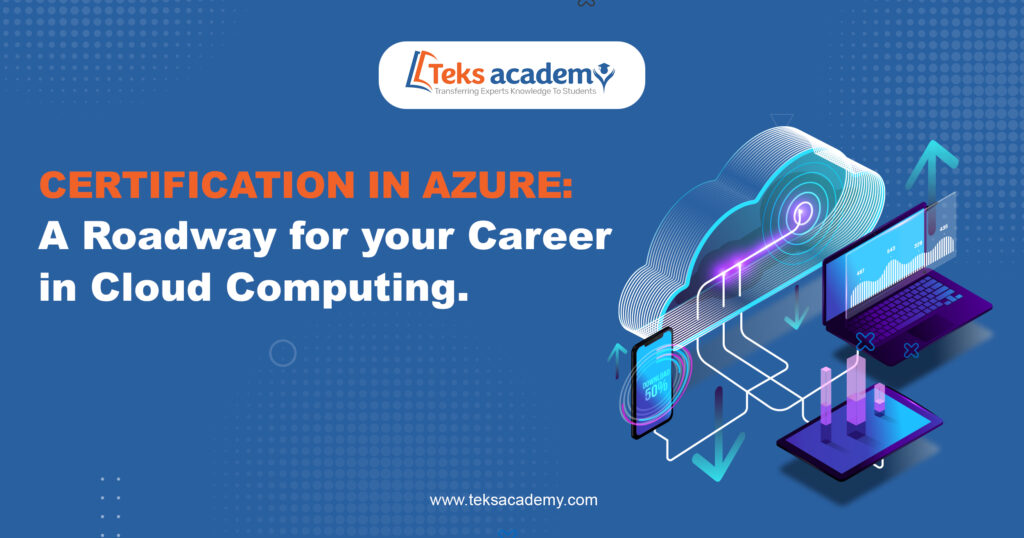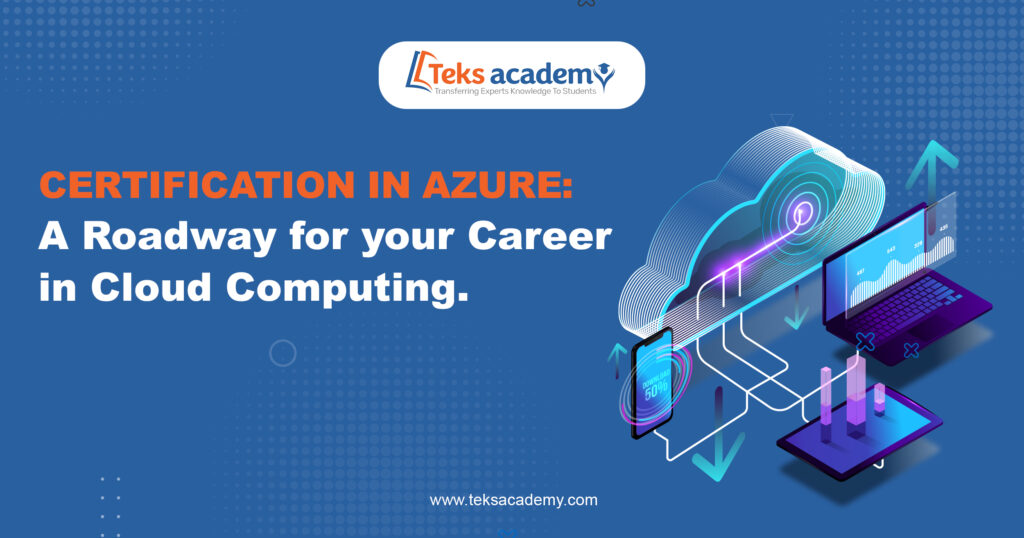Cloud computing is the fastest-moving technology in the IT industry today. Worldwide, the cloud computing market will increase by 33% in 2023. Statistics state that only Microsoft Azure grew, with an increase in the percentage of 40% in the last year. Next to AWS, Microsoft Azure is the second-largest and fastest-growing cloud computing platform.
The rapid growth of Azure leads to an increase in the number of jobs for people with excellent Azure skills. The best way to improve your Azure skills and showcase your expertise in the cloud computing industry is by starting with the Microsoft Azure Fundamentals certification. There are numerous Azure online courses available that help you gain a proper understanding of the cloud computing industry and its certifications.
We are going to give you more detail about the available certifications in Azure.

Detailed Azure certifications:
Microsoft Azure gives various certifications depending on the role and job title you hold in cloud computing. There are various job titles available, such as Azure Solution Architect, Azure Developer, Azure AI Engineer, Azure Developer Associate, etc. Primarily, Azure roles are organized into four categories, which are listed below.
- Fundamentals.
- Associate.
- Expert.
- Specialty.
Every certification focuses on building the knowledge and skills that help to level up your career in cloud computing.
Microsoft Azure Fundamentals Certification:
Azure Fundamentals – AZ-900:
Azure Fundamental Certification gives you foundational knowledge that validates your learning and the skills you develop in the cloud computing industry. Beginners and experienced users who are looking to develop a strong foundation in cloud computing can pursue this certification through Azure online courses.
What will you learn?
- A thorough understanding of cloud computing concepts gives you high reliability, scalability, availability, and types of computing services available.
- A greater understanding of storage, networking, and core architectural components of Azure.
- How to access, identify, and provide security.
- Get a detailed understanding of monitoring tools, management, governance, and tools that are used to monitor.
Azure AI Fundamentals Certification – AI-900:
To take the Azure AI Fundamentals Certification, candidates need to clear the AI-900 certification. The major difference between AZ-900 and AI-900 is the basic knowledge of the Artificial Intelligence and Machine Learning solutions added to the AI-900 certification.
What will you learn?
- Deep understanding of AI workloads and their considerations along with guiding principles.
- Learning of fundamental principles of Machine learning that are used in Azure.
- Cloud-based computer vision tasks.
- Usage of Natural Language Processing (NLP) in Azure.
Azure Data Fundamentals Certification – DP-900:
To pursue and get this certification, a candidate must have a basic understanding of Azure. This certification provides knowledge about the core concepts of Azure cloud computing, analytics workloads, and non-relational data.
What will you learn?
- Deep understanding of core concepts and common workload data.
- How to identify the relational data and relational concepts on Azure.
- How to work on non-relational data on Azure that includes capabilities of Azure Cosmos DB.
- How to describe workloads on Azure that includes large-scale data analytics, real-time data visualization in Microsoft Power BI.
Security, Compliance, and Identity Fundamentals – SC-900:
The SC-900 is the entry-level cybersecurity exam that addresses a thorough understanding of security, compliance, and identity in Azure to protect users. Learners will be familiarized with concepts like “zero trust, data residency, and shared responsibility.
What will you learn?
- Core concepts of Security, compliance, and identity.
- Understand Azure Active Directory.
- Capabilities of Microsoft security and compliance solutions.
Associate Level Azure Certifications:
Azure Administrator Associate Certification – AZ-104:
The certification provides you with details about the administrator’s core responsibilities, how to implement the Azure cloud system, and coordination with other stakeholders to deploy DevOps solutions.
Learners will gain a deeper understanding of virtual networks, the adjustment of resources, provisioning, and monitoring identity.
What will you learn?
- Hands-on experience with Azure Active Directory (AD).
- How to implement and manage Azure files and Azure Blob storage.
- How to deploy Azure compute resources, and Azure App Service.
- How to configure virtual networks and load balancers.
- How to utilize Azure Application gateway.
Azure Developer Associate Certification AZ 204:
Azure cloud architects who want to boost their knowledge of Azure Development Solutions can pursue this certification. Learners will learn in-depth attributes of Azure app services, serverless architectures, and microservices-based architectures.
The Azure Developer Associate Certification is particularly useful for those who are interested in the design and deployment of Azure cloud services. To become successful in this certification, candidates must have a minimum of 2 years of experience along with proficiency in data storage and connections.
What will you learn?
- How to develop Azure computing solutions that include IaaS and Azure functions.
- How to develop Azure Cosmos DB and Blob storage.
- Implementation of security that includes authorization and authentication.
- How to control, improve, and analyze Azure Services.
- How to connect and consume Azure services using event andmessage-based solutions.
Azure Security Engineer Associate Certification – AZ-500:
Learners who want to learn the implementation and management of security controls and access management can pursue the Azure Security Engineer Associate Certification. The Azure Security Engineer is responsible for managing cloud-based solutions.
This exam requires proficiency with automation and scripting, virtualization technology and networking, and Microsoft cloud services and products.
What will you learn?
- How to manage identity and access with the help of role-based access control (RBAC).
- How to implement platform protection that includes advanced security.
- Deep understanding of security operations and policy management, and security monitoring solutions.
- How to secure data and applications.
Azure Network Engineer Associate Certification – AZ-700:
The Azure Network Engineer Associate Certification helps professionals design and deploy the best networking solutions for their businesses. This certification is suitable for people who have experience in Microsoft Azure networking.
What will you learn?
- How to manage and implement hybrid networking.
- Design and implementation of core networking infrastructure, and routing.
- Secure and monitoring of networks.
- How to implement and design access to Azure services in private.
Azure AI Engineer Associate Certification – AI-102:
The AI Engineer Associate Level Certification is designed for learners who need to implement AI languages like natural processing language, and bots using Cognitive services and search.
What will you learn?
- How to plan and manage Azure Cognitive Solutions.
- Implementation of natural language processing solutions.
- Implementation of knowledge-mining solution.
- How to implement computer vision solutions.
- Implementation of conversational AI solutions.
Azure Data Scientist Associate Certification – DP-100:
The Data Scientist certification in Azure helps the learners gain knowledge in data science and machine learning that helps them run machine learning on Azure. Learners will learn how Azure machine learning is used to approach evaluation, training, and other deployment models to solve business problems.
What will you learn?
- How to design and prepare a machine learning solution.
- How to explore data and train models.
- Prepare a model for deployment.
- Deploy and retain a model.
Azure Data Engineer Associate Certification – DP-203:
The Azure Data Engineer Associate is an advanced-level certificate exam that helps learners develop their analytical skills in transforming, integrating, and consolidating data from various systems. The certification helps in exploring, analyzing, and processing data on Azure.
What will you learn?
- Design and implement data storage and data security on Azure.
- Design and implement data processing on Azure.
- How to monitor and optimize data storage and processing on Azure.
Azure Database Administrator Associate Certification – DP-300:
The Administrator Associate Certification is suitable for learners who are interested in the administration of cloud-based database systems. The candidates involved in the management of Azure data services and SQL Server
What will you learn?
- How to implement data platform services.
- Implementation of secure services.
- How to monitor, configure, and optimize database services.
- How to configure and manage the automation tasks.
- How to plan and configure the disaster recovery (HA/DR) environment.
Azure Security Operation Analyst Associate Certification – SC-200:
The certification is suitable for the IT professionals who need to upgrade their skills on mitigation of cyber threats using Microsoft Defender and Sentinel.
What will you learn?
How to mitigate threats using Microsoft 365 defender, Microsoft defender for cloud, and Sentinel.
Azure Security Identity and Access Administrator Associate Certification – SC-300:
The Security Identity and Access Administrator Certification helps the learner to manage and implement an authentication and access management solution.
What will you learn?
- How to implement identity in Azure AD.
- How to implement authentication and access management.
- How to implement access management for applications.
- How to plan and implement governance in Azure AD.
Azure Expert-Level Certifications:
Azure Solutions Architect Expert Certification – AZ-305:
Candidates need to pass both AZ-305 (Azure Solutions Architect Expert) and AZ-104 (Azure Administrator Associate Exam) to get certification in this expertise. The certification is intended for candidates with knowledge in Azure Architecture.
What will you learn?
How to design data storage solutions, infrastructure solutions, identity, governance, and monitoring solutions, and business continuity solutions.
Azure DevOps Engineer Expert Certification – AZ-400:
Candidates must pass either AZ-104 (the Azure Administrator Associate Exam) or AZ-204 (the Azure Developer Associate Exam) to get certified as an Azure DevOps Engineer Expert. The exam is suitable for DevOps professionals who deliver business-valued services and products. DevOps engineers are accountable for the delivery of cloud services by improving the design and implementation of app development strategies, monitoring, and automation of delivery services.
Learners should be proficient in the Azure development and operation processes.
What will you learn?
- Implementation of identity management solution.
- Implementation of authentication and access management solution.
- Planning and implementation of identity governance strategy.
In Conclusion:
Obtaining one or more of the aforementioned certificates can help you understand Azure better. Since there is an increasing need for qualified cloud computing specialists in the IT industry, Certification in the cloud computing business shows that you are dedicated to acquiring new skills and being current in the field, giving you an advantage in the job market.
Whether you are new to the industry or a skilled professional, mastering the fundamentals of Microsoft Azure helps you kick start your career and move faster in your career ladder, giving you a handful of experience and opportunities. Azure certification courses give you all the experience and a strong understanding of the fundamentals that help you demonstrate your skill in cloud computing.






